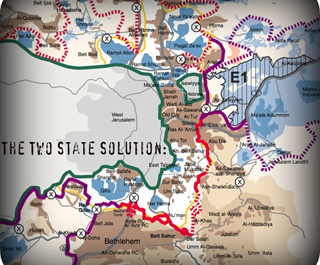Today's
Haaretz features an article headlined "U.S. drops demand for
Israel building freeze in East Jerusalem." A surprisingly
authoritative-sounding headline, given the leak-free approach of the Mitchell
team thus far.
Savvy consumers of the news - including members of the peace camp who may
be fearful that the Obama Administration, like so many US administrations that
have gone before it, will eventually give in to Israel on these key issues -
would do well to remember that in this kind of high-stakes political poker, a
lot of what we hear in the press is spin (and bluffing). And we would all do
well to wait and see what is actually agreed before passing judgment. If the
agreement is good - however it is framed - then we will praise it. If it
is bad, there will be plenty of opportunity to criticize it at that time.
American foreign policy: August 2009 Archives
Hagit Ofran, the director of Peace Now's Settlement Watch, has an important analysis over at the Huffington Post laying out the criteria for a meaningful settlement freeze. In a nutshell, she writes that a freeze must:
(a) have no loopholes -- (for more on loopholes, see our "5 Bogus Reasons for Opposing a Settlement Freeze),
(b) be transparent, especially with respect to any construction that Israel insists on "completing" despite the freeze;
(c) not include anything that could be interpreted as US permission or approval for any settlement construction -- now or in the future -- anywhere, and not include anything that could be interpreted as establishing new "understandings" about where Israel thinks it can build, and
(d) apply not only to construction but also planning.
Perhaps the most important take-away from her analysis is the following: yes, we'd prefer a freeze that includes every single structure and is permanent. But let's remember: a freeze is not an end in itself. The goal here is to get a freeze that is politically significant and sufficiently credible to help launch serious negotiations that, if they succeed, will render the details of the freeze irrelevant, since a final status agreement will resolve the issue, once and for all. A freeze that at a minimum meets the criteria laid out by Hagit, while not the perfect airtight freeze we would love to see -- for Israel's own sake -- would nonetheless be politically significant and sufficiently credible to help launch such negotiations. For this reason, we would gladly support such a freeze.
(a) have no loopholes -- (for more on loopholes, see our "5 Bogus Reasons for Opposing a Settlement Freeze),
(b) be transparent, especially with respect to any construction that Israel insists on "completing" despite the freeze;
(c) not include anything that could be interpreted as US permission or approval for any settlement construction -- now or in the future -- anywhere, and not include anything that could be interpreted as establishing new "understandings" about where Israel thinks it can build, and
(d) apply not only to construction but also planning.
Perhaps the most important take-away from her analysis is the following: yes, we'd prefer a freeze that includes every single structure and is permanent. But let's remember: a freeze is not an end in itself. The goal here is to get a freeze that is politically significant and sufficiently credible to help launch serious negotiations that, if they succeed, will render the details of the freeze irrelevant, since a final status agreement will resolve the issue, once and for all. A freeze that at a minimum meets the criteria laid out by Hagit, while not the perfect airtight freeze we would love to see -- for Israel's own sake -- would nonetheless be politically significant and sufficiently credible to help launch such negotiations. For this reason, we would gladly support such a freeze.
Today, Jerusalem expert Daniel Seidemann, of the Israeli NGO Ir Amim, circulated his observations on Mike Huckabee's East Jerusalem adventure (or better yet, adventurism) and what it says about Jerusalem and President Obama's peace efforts. Read the full analysis after the jump...

Like many people I know, I spent a lot of time wrestling with how to react to the recent New York Times op-ed by Rob Malley (who I know well and admire tremendously) and Hussein Agha, entitled "The Two-State Solution Doesn't Solve Anything." Fundamentally, while I respect the sincerity of their analysis, I think they got it wrong. Here's why:
Continue reading The Two-State Solution: Never About Solving Everything.
1
American foreign policy Monthly Archives
- July 2013
- May 2013
- March 2013
- December 2012
- September 2012
- August 2012
- July 2012
- November 2011
- October 2011
- August 2011
- July 2011
- May 2011
- April 2011
- November 2010
- September 2010
- July 2010
- April 2010
- March 2010
- January 2010
- November 2009
- October 2009
- September 2009
- August 2009
- July 2009
- June 2009
- May 2009
- April 2009
- March 2009
- February 2009
- January 2009
- December 2008
- September 2008
- August 2008
- July 2008
- May 2008